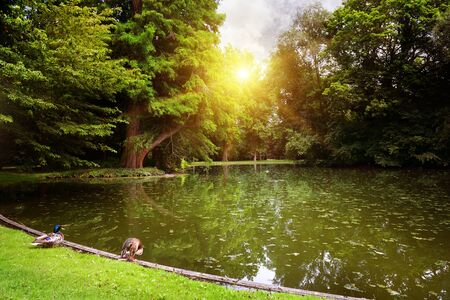Introduction to Wild Swimming in the UK
In recent years, wild swimming has surged in popularity across Britain, emerging as a celebrated form of cold water therapy within the realm of naturopathy. Once regarded as an old-fashioned pastime, immersing oneself in the country’s lakes, rivers, and coastal waters is now experiencing a vibrant revival. This movement is not only about braving chilly temperatures but also reconnecting with the natural beauty unique to the British Isles. From the tranquil lochs of Scotland to the meandering rivers of England and the rugged coasts of Wales, wild swimming offers a distinctive way to experience the healing power of nature. The practice draws on both tradition and modern wellness trends, reflecting a collective desire to harmonise body and mind through contact with water and landscape. As more people seek respite from urban life and digital overload, wild swimming serves as both a physical challenge and a mindful ritual, weaving together cultural heritage and contemporary well-being.
2. Historical Roots and Contemporary Appeal
Cold water immersion has a rich heritage within British naturopathy, tracing its roots to the 18th and 19th centuries when hydrotherapy was widely advocated by pioneers such as Vincent Priessnitz and Sebastian Kneipp. In Britain, the Victorian era saw the rise of public bathing establishments and seaside resorts, where cold sea bathing was recommended for invigorating the body and restoring balance. Traditional British naturopathic thought views cold water as a means to stimulate the flow of qi, or vital energy, harmonising the internal landscape much like classical Chinese medicine’s emphasis on yin-yang balance.
Today, wild swimming and cold water therapy are experiencing a renaissance among modern communities across the UK. This resurgence is fuelled by a growing awareness of both physical and mental health benefits—ranging from improved circulation to enhanced emotional resilience. Modern practitioners echo their forebears in valuing natural environments: lakes, rivers, and the iconic British coastline provide tranquil settings for reconnecting with nature and oneself.
Historical Significance vs. Contemporary Reasons for Popularity
| Historical Significance | Contemporary Appeal |
|---|---|
| Victorian era sea bathing for health | Stress relief & mental wellness |
| Naturopathic hydrotherapy traditions | Connection to nature & community |
| Restoration of internal balance (qi) | Boosted immunity & physical vitality |
| Cultural rituals around water immersion | Accessible outdoor activity for all ages |
The enduring appeal of cold water therapy lies in its bridging of ancient wisdom with contemporary well-being trends. As people seek natural remedies for modern stressors, wild swimming offers an authentic experience rooted in both tradition and present-day science. The ritual of immersing oneself in Britain’s cool waters continues to resonate with those who value holistic health—nourishing both body and spirit in harmony with the rhythms of nature.

3. Benefits for Body and Mind
Wild swimming in the cool rivers, lakes, and coastal waters of Britain is not only a refreshing pastime but also a practice with profound benefits for both body and mind. From the perspective of Western science, immersing oneself in cold water triggers a range of physiological responses: blood vessels constrict, heart rate increases, and the body releases endorphins—a natural “feel-good” chemical. Regular cold water exposure has been associated with improved circulation, enhanced immune function, and even reduced inflammation, which may help ease aches and pains common to modern life.
Yet, this British tradition is more than just biology; it is deeply rooted in holistic principles that value harmony between body, mind, and nature. In line with naturopathic philosophy—so cherished within the UK’s wellness communities—cold water therapy is seen as a way to balance the body’s internal energies. Much like traditional Chinese medicine’s concept of yin and yang, the cold water acts as a gentle stressor, encouraging the body’s adaptive capacities and resilience (what TCM would call “strengthening the Wei Qi,” or defensive energy).
On a psychological level, wild swimming offers an opportunity for mindful presence. The bracing touch of cold water brings one instantly into the moment—thoughts quieten as you focus on breath and sensation. Many British swimmers report feelings of calm, clarity, and renewed vitality after their dip. This mirrors both Western research on mood improvement through endorphin release and holistic beliefs in “clearing stagnant Qi” to foster emotional well-being.
In summary, whether viewed through the lens of scientific evidence or traditional wisdom, cold water swimming stands out as a practice that nurtures both physical health and mental harmony—a true embodiment of Britain’s growing interest in natural therapies.
4. Traditional Eastern Views on Cold Therapy
In the realm of Traditional Chinese Medicine (TCM), cold water exposure is approached with a nuanced understanding, rooted in the principles of balance and harmony. TCM posits that health is achieved when yin and yang—the dual forces representing cooling and warming energies—are in equilibrium. Excessive cold, whether from the environment or lifestyle choices, is believed to disrupt this delicate balance, potentially leading to stagnation of Qi (vital energy) and impaired circulation.
Yet, when harnessed thoughtfully, cold therapy can serve as a therapeutic tool. It is not about simply enduring discomfort; rather, it’s about mindful adaptation and respecting individual constitution. For instance, TCM practitioners often assess whether someone has a ‘cold’ or ‘hot’ body type before recommending cold water practices. Those with robust yang energy may benefit from occasional exposure to cold environments as a way to invigorate their system and temper internal heat, while individuals who tend towards a ‘cold’ constitution are usually advised caution.
The Role of Cold in Promoting Harmony
The philosophy underpinning cold therapy in TCM is not unlike the British enthusiasm for wild swimming: both traditions value nature’s elements as tools for restoring well-being. However, TCM emphasises gradual adaptation and moderation. Rather than plunging into icy waters without preparation, Eastern wisdom encourages gentle acclimatisation—perhaps beginning with cool foot baths before progressing to full immersion.
Comparative Insights: TCM vs. Modern Wild Swimming
| Aspect | Traditional Chinese Medicine | British Wild Swimming Culture |
|---|---|---|
| Purpose | Restore energetic balance and support organ health | Enhance physical vitality and mental wellbeing |
| Approach | Personalised based on body constitution; gradual exposure recommended | Often community-based; adventurous spirit encouraged |
| Cautions | Avoid for those with weak yang or chronic coldness | Risk assessment based on water safety and temperature tolerance |
| Philosophy | Harmony with natural cycles; seasonal awareness | Connection with nature; embracing challenge |
Towards Integration: East Meets West
As wild swimming gains popularity across Britain, there is growing interest in blending ancient Eastern wisdom with contemporary naturopathic practices. By honouring the principles of balance and self-awareness championed by TCM, British enthusiasts can approach cold water therapy not only as an invigorating pastime but also as a path towards holistic health, fostering harmony between mind, body, and the rhythms of the natural world.
5. Practical Guidance for Wild Swimming Enthusiasts
Embracing the Elements: A British Perspective
Wild swimming has become a cherished practice across the UK, blending the invigorating chill of natural waters with a deep-rooted respect for nature’s rhythms. As interest grows in this form of cold water therapy, it is vital to approach it with both enthusiasm and caution, especially considering the unique climate and cultural context of Britain.
Tips for Beginners: Starting Your Journey Safely
If you are new to wild swimming, begin by seeking out well-known locations such as local lakes, rivers, or coastal spots that are popular among experienced swimmers. Always check the safety and water quality reports provided by local authorities or wild swimming groups. Dress appropriately: in the UK’s often brisk weather, a good-quality wetsuit can help buffer your body against the initial shock of cold water while still allowing you to experience its therapeutic effects. Start with short dips—just a few minutes at a time—and gradually build up your exposure as your body adapts.
Regular Practitioners: Deepening the Connection
For those who have already made wild swimming part of their routine, further harmonise your practice with traditional British wisdom. Pay attention to seasonal changes; during colder months, follow the advice of seasoned swimmers by warming up properly before entering the water and bringing warm clothing and hot drinks for after your swim. Listen to your body’s signals—cold exposure should never feel painful or forced. Instead, seek the balance between invigorating challenge and gentle self-care, reflecting both modern naturopathic understanding and age-old practices akin to those found in Chinese medicine.
Cultural Considerations: Respecting Nature and Community
The UK is home to many beautiful wild swimming spots that are cherished by local communities. Always leave no trace: take all belongings and rubbish with you, avoid disturbing wildlife, and respect private property boundaries. Join local swimming groups to gain insights from experienced enthusiasts and foster a sense of community—these connections can be just as restorative as the swim itself.
Integrating Mindfulness and Breathwork
To fully benefit from cold water therapy, combine your swim with mindful breathing techniques—a concept mirrored in both British wellness culture and traditional Eastern practices. Before entering the water, take a few moments to centre yourself with slow, deep breaths. This not only prepares your body but also helps cultivate a sense of harmony between mind and environment, enhancing the overall therapeutic effect.
Weather Wisdom: Adapting to British Conditions
The unpredictable British weather calls for flexibility. Always check forecasts before heading out, and be prepared to postpone swims if conditions turn unsafe. Embrace the diversity of Britain’s climate; each season offers unique opportunities for renewal and reflection through wild swimming, whether it’s misty autumn mornings or sunlit summer afternoons.
6. Community, Connection, and Sustainability
One of the most remarkable aspects of wild swimming within the British naturopathic tradition is its power to bring people together. Across the UK, rivers, lakes, and coastal spots have become meeting places for those seeking not just cold water immersion, but also genuine human connection. The shared experience of braving chilly waters fosters a unique camaraderie; swimmers often describe a deep sense of belonging and mutual support, echoing ancient traditions where communities would gather at natural springs for health and healing.
This social dimension mirrors core tenets of both traditional Chinese medicine and holistic British wellness philosophies, where emotional wellbeing and collective spirit are seen as vital to overall health. Regular wild swimming groups offer opportunities for mindful conversation, laughter, and encouragement—nourishing not only the body but also the mind and heart. These gatherings create supportive networks that help participants maintain regular practice, especially through the more challenging winter months.
Moreover, wild swimmers frequently develop a profound appreciation for Britain’s diverse waterways. Immersing oneself in the living landscape naturally cultivates a sense of stewardship—participants often organise litter picks, advocate for cleaner water policies, and raise awareness about ecological threats facing local rivers and seas. This blend of personal wellbeing with environmental responsibility embodies a holistic approach: honouring both individual vitality and the health of our natural world.
As wild swimming continues to grow in popularity across Britain, it is not merely a solitary or even physical pursuit; it has become a vibrant movement rooted in community spirit and environmental mindfulness. In this way, cold water therapy reconnects us with each other and the land, offering a refreshing reminder that true wellness thrives when we care for ourselves, our neighbours, and our precious blue spaces in equal measure.


